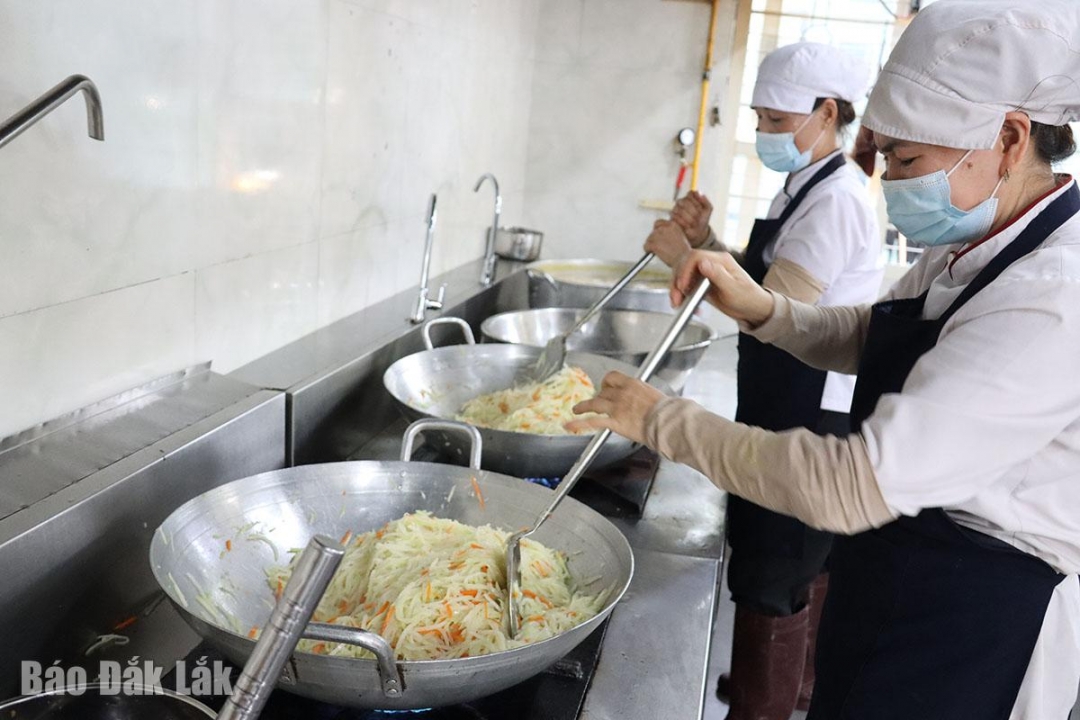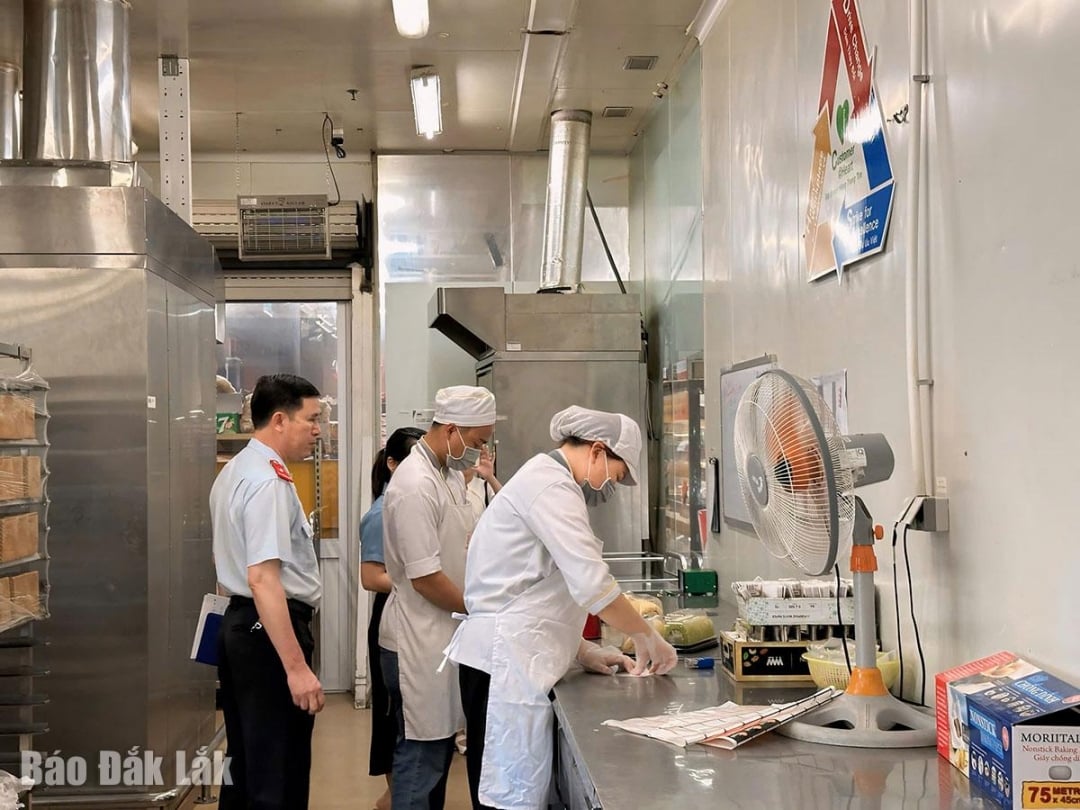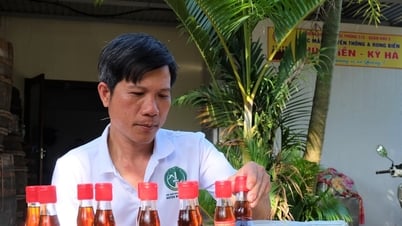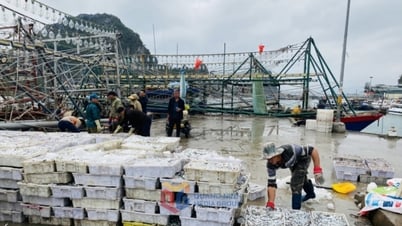Thanh Nhat Kindergarten (Buon Ma Thuot City) currently has more than 300 children attending and organizes boarding meals. Children, depending on their age, will be fed 2-3 meals/day. To ensure food safety for children, the school has developed specific plans such as child care, nutrition to ensure food safety, prevention of food poisoning; limiting the use of packaged and processed foods. Every day, under the supervision of the Boarding Monitoring Team, the kitchen staff will receive food according to the menu. The evaluation criteria are that the food must have a clear origin, the food must be fresh, and there must be no signs of freezing.
The school's kitchen system is also built according to the one-way principle from the preliminary processing stage to the food distribution stage, with enough utensils and tools for the kitchen and is scientifically arranged, distinguishing between raw and cooked processing tools. The processing area is regularly kept clean, following the 10 golden principles in food processing and the 5 golden keys to safe food; kitchen staff are trained in food safety and hygiene knowledge and have regular health check-ups.
 |
| School canteens follow a one-way rule to ensure food hygiene and safety. |
At the Center for Supporting the Development of InclusiveEducation for Children with Disabilities, each meal the Center serves more than 180 meals, for children with hearing impairments, intellectual disabilities, autism and early intervention, the food portions are also balanced to suit. The Center also strictly complies with food safety conditions, from processing personnel to facilities, food sources, and hygiene issues. The Center's Board of Directors also regularly checks the source of raw materials, the process of preparing, processing and storing food samples. To have meals with enough nutrients and ensure hygiene, the Center has established a Boarding Supervision Team, which daily checks and supervises the origin of food, hygiene, and meal quality. In addition, the Center also focuses on meals for special cases such as sick students, obese students, students with allergies to certain foods.
Ms. Krong Ai Huong Lan, Deputy Head of the Department of General Education and Vocational Education - Continuing Education (Department of Education and Training) said that the province currently has 87/364 primary schools, 325/327 kindergartens and the Center for Supporting the Development of Inclusive Education for Children with Disabilities that organize boarding meals. Most schools have one-way kitchen areas, ensuring separation between raw and cooked food. The rate of schools with kitchens that meet hygiene standards according to the Food Safety Law is over 85%, with nearly 95% in urban and town areas. Schools have also developed weekly menus in advance and made them public on the website and parent groups of each class for parents to monitor and follow.
 |
| Health Department inspectors inspect food processing and preservation at a business establishment selling fresh and processed food. |
In recent years, the province has not recorded any cases of food poisoning in school canteens, but digestive disorders that have caused many students to be hospitalized for observation still occur. For example, the suspected food poisoning case that caused 8 students of Victory Primary, Secondary and High School (Buon Ma Thuot City) to be hospitalized for observation; or the case of 11 students of Nguyen Cong Tru Secondary School (Ea Ngai Commune, Krong Buk District) who were hospitalized for suspected food poisoning after eating a salad they prepared themselves in class.
The above situation shows that food safety assurance work is currently facing major challenges such as: chemical residues in food; food safety and hygiene conditions of processing facilities; difficulties in controlling fake, poor quality, smuggled food; low awareness of compliance with food safety and hygiene laws of some production and business establishments...
On the other hand, some schools in the province do not have their own cafeterias, students still have to eat in the classroom, and the kitchen area is still cramped and not suitable for the current number of meals.
For units equipped with water filtration systems for students to drink, periodic maintenance of the water filtration system has not been performed; periodic testing of water sources and water after passing through the filtration system does not meet all criteria.
Along with that, some schools do not have medical staff on the payroll to perform professional duties, so the work of advising and ensuring food safety and hygiene is still limited, especially the three-step food inspection and food sample storage.
For schools and school locations far from district and commune centers, during the rainy and stormy season, it is impossible to transport fresh food every day. There is still a situation of using refrigerated food and packaged products, affecting the quality of boarding meals.
Source: https://baodaklak.vn/xa-hoi/202504/bao-dam-an-toan-thuc-pham-bep-an-hoc-duong-van-con-nhieu-thach-thuc-da11b97/



![[Photo] Top players gather at the 2025 Nhan Dan Newspaper National Table Tennis Championship](https://vphoto.vietnam.vn/thumb/1200x675/vietnam/resource/IMAGE/2025/5/23/9ad5f6f4faf146b08335e5c446edb107)

























































































Comment (0)